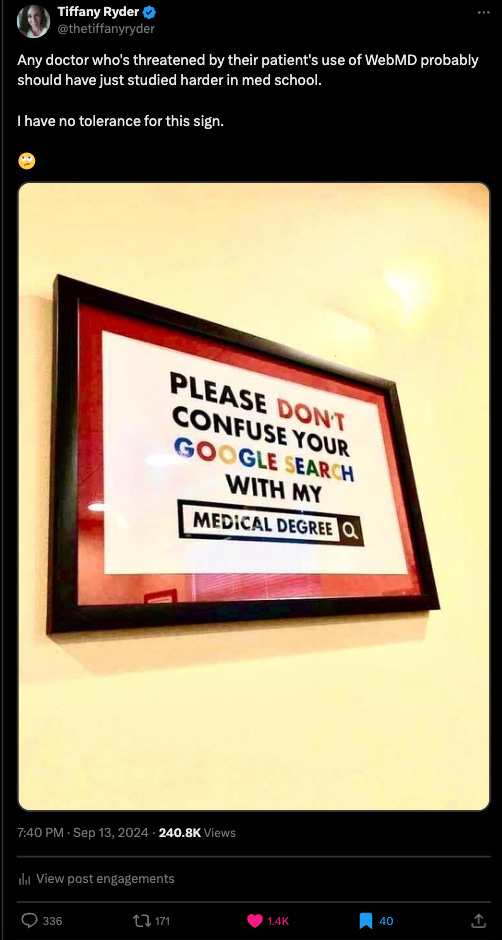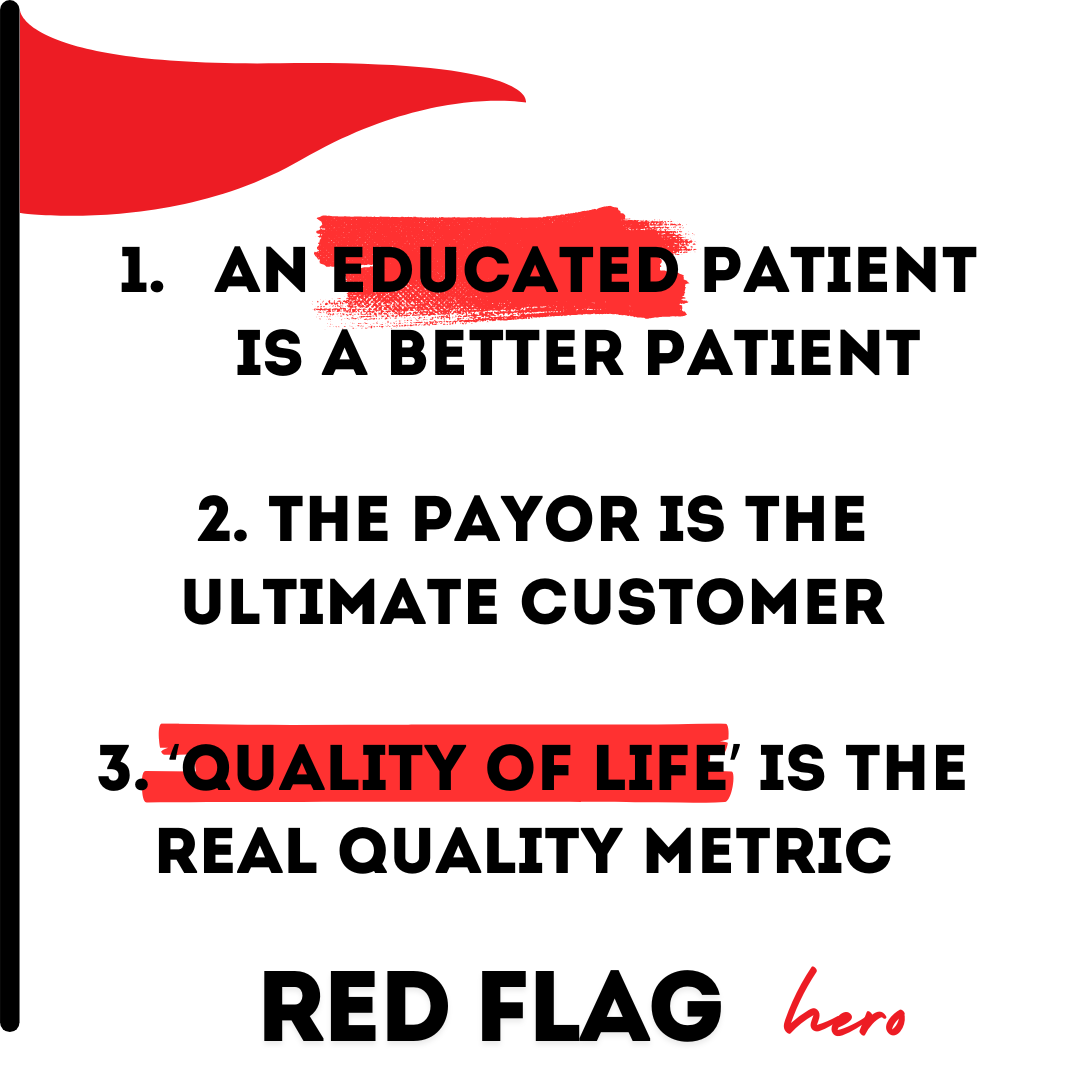You Can Identify Top 1% Quality Healthcare by Paying Attention to These Simple (Overlooked) Things
The power of trusting yourself over ‘the experts’
Defining “quality healthcare” is practically impossible.
If you ask 10 different people what makes for a ‘good doctor,’ a ‘good hospital’ or a ‘good healthcare experience,’ you’ll get 10 different answers.
In all of the ambiguity, it’s incredibly tempting to just hand over the responsibility of deciding who is worthy of providing care for you or your family to some media organization handing out ‘stars’ or rankings (looking at you US News and World Report), but I can assure you that those ratings don’t tell the whole story on ‘quality.’
Relying on ‘experts’ simply does not ensure you will have a better outcome, a better experience or really any other advantage - no matter who finds themselves on the list.
Those of you who know me have probably overheard me telling patients some version of the following:
YOU are the only decision maker that matters.
YOU are the f*cking boss.
Not your doctor.
Not your employer.
Not your pharmacist.
Not the insurance company.
And while that’s 100% true, it’s also intimidating.
If YOU are the ultimate decision maker, then YOU are responsible for determining quality of care… and how the hell are you gonna know how???
To demonstrate what I mean, take a look at this patient quote…
My back doctor has been just amazing despite the fact that I’ve needed so many revisions to treat my neck pain! He’s just been so patient with me throughout the whole ordeal.
Excuse me, what?
So, did this patient actually have:
A crappy surgeon with excellent bedside manner?
A particularly hard-to-treat case?
Or maybe just a run of really bad luck?
It’s totally unclear.
And if you take it one step further, thinking about care more generally, you might also wonder:
Is the least invasive care best? Or is the cheapest the best? Or the fastest?
Is an A-hole doctor with a low complication rate better than a kind one with a higher rate?
Why DO complication rates between clinicians vary? Does one doctor only operate on easy cases or are they actually more conscientious?
I could go on…
The reality is that what ‘quality’ metrics we should be measuring as a system, and what patients should be looking out for is challenging no matter how you break it down.
And as much as I want to leave this topic alone - I can’t.
So, last week, I took a trip to Nashville to hash it out on stage with two of the smartest nonclinical healthcare systems experts that I know- David Balat and Emma Fox.
David Balat is a national healthcare policy advisor and CEO of Med X Global. Emma Fox is a serial healthcare entrepreneur and CEO of E-Powered Benefits.
These two industry leaders have dedicated their careers to implementing common-sense healthcare reform to make care more affordable and more accessible for patients… SO surely the 3 of us could come to a consensus on exactly what measurable outcomes or attributes actually define ‘quality care,’ right?
Well… not exactly. Once you start peeling the onion of incentives and unintended consequences, it’s not as easy as you’d imagine. But the discussion highlighted some fundamental concepts that point towards ‘quality’ and I want to share those here.
Here are 3 awesome ‘rules-of-thumb’ that you can follow to make sure you are in an environment to get high-quality care.
1. An educated patient is a better patient - so learn all you can, and make sure your efforts are welcome.
Look at the engagement on this nothing-burger of a statement that I posted over the weekend.
240k views and over 1.4k engagements in 24 hours?!
Do you think people are disgusted with the healthcare experience?
Absof*ckinglutely.
The most surprising thing about this post was that most of the comments and reposts came from physicians themselves, and centered around their intolerance of paternalism, authoritarianism, and the gate-keeping of medical knowledge.
Good clinicians want informed patients because an informed patient is in the BEST position to have a worthwhile discussion about their symptoms, diagnosis and treatments.
Even if your understanding of the situation isn’t perfect, clarity comes from open and honest discussions. An engaged patient paired with a clinician who will listen and teach forms the ideal environment for quality care.
If your doctor isn’t willing to engage with you respectfully- answering your questions and explaining their recommendations- they aren’t a good fit for your clinical team, and you may want to use that as your cue to find someone who is.
2. The closer the purse strings are to YOU (the patient) & your doctor, the more control you have over the quality of your care.
Another interesting aspect of the quality discussion is simply who gets to define ‘quality.’
Direct contracts and direct pay greatly impact care by making the YOU the customer - instead of the insurance company.
Here’s an example of how things work when that’s NOT the case.
Let’s say the taxpayer (medicare) pays a higher reimbursement rate to hospitals who go the ‘extra mile’ to make sure that patients don’t suffer falls (and incur higher medical costs from those falls) while under their care.
Sounds like a good thing right?
Patients are safer, care is cheaper and arguably these facilities have earned a premium price for their good work!
But also…
What if the hospital (in the interest of minimizing falls and maximizing payments) decides that patients are no longer allowed to walk around while admitted… ever (since after all that IS when falls most frequently occur)… AND, not just that, but in addition to bed rest restrictions, maybe more liberal use of restraints is encouraged. On paper, hospitals restricting patient movement would appear ‘higher quality,’ but in reality patients might be suffering from more blood clots, slower recovery times and overall negative hospital experiences.
Sad as that may seem, it’s worse.
Patient complaints are arguably more likely to fall on deaf ears if the insurance company is the ‘payor’ and change could negatively impact the hospital’s bottom line, but what if the patient (or their employer) were the ones to please?
That’s the impact of direct contracting and direct payments.
When agreements are made between a patient (or their employer) and a hospital system (or clinician) it allows for what counts as ‘quality’ care to be determined by the parties actually involved without interference by multiple 3rd parties along the way.
Based on their own experience, the patient can decide, “Have I been treated ethically and respectfully with good outcomes?” and then make decisions about future care based on their answer rather than having someone in DC or the insurance company’s corporate headquarters deciding.
If at all possible, be the customer. Reducing reliance on third-parties through direct payment arrangements or direct contracting gives you more control over the quality of your care.
Ultimately, quality of life is the only true quality metric - everything else is an approximation.
Billions of dollars are spent measuring quality in a variety of specific and complex ways, and while I’m not saying someone shouldn’t be measuring… IDK something, many things... I am saying that specific measures often don’t tell the whole story AND (as discussed above) can have horrible unintended consequences.
When assessing quality as a patient, take a moment to ‘zoom out.’
Look at simple quality of life metrics and you might find that there’s a much clearer story to be told. What if instead of trying to perform some acrobatic calculus, you approached care by asking yourself some version of the following:
How do I feel? Are my questions heard? Do I understand what’s happening to me?
Is my condition managed well-enough that I can play with my kids, make coffee, go to work?
Have my treatments been affordable enough that my family is able to continue living their life or am I contemplating bankruptcy?
Because aren’t these questions the ones that really matter? And not just that, but if poor care is given and poor outcomes result, wouldn’t these measures capture it?
I’ll leave you with this.
If the net result of our interventions long-term are to make patient’s lives worse, are we really helping?
Just food for thought.
In summary:
I want you to know that I care about you, and I’m excited to help and learn from your experiences.
How do YOU think about quality? What measures do you look at when choosing a care provider?
I’d love to hear in the comments below.
And if you found this helpful, I’d love for you to consider sharing it with a friend!
Never medical advice and until next week,
Tiffany









Quality of care is difficult to measure when hospital systems try to control the entirety of your care. Once they trap you in their net, they're relentless with reaching out to you to secure your next specialty appointment, then refer back to your PCP....it's a repetitive cycle. They don't allow you any time to research and choose someone you're comfortable with. On top of this are ghost networks and/or providing lists with zero information. It takes persistence and diligence to get what you want. The system is broken.
QC for me is (random order)
- A doctor who will take the time to listen
- Did their homework (looked at your history prior to your visit)
- Credibility: others speak well of him/her and had great results
- Lays out all of your options w/ pro's/con's
- is willing to change course based on new evidence
I would define quality as the right care, at the right time, delivered with loving compassion.
Right care encompasses both appropriateness of care and cost
Right time means not too early or too late
Love is the most powerful force in the universe